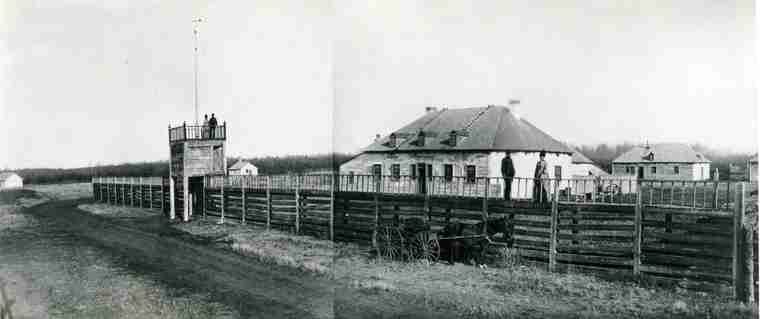
- Details
- By Jenna Kunze
The toll of unmarked graves holding the remains of Indigenous children in Canada increased by 54 yesterday following the announcement from Keeseekoose First Nation in Saskatchewan.
The Nation found the graves using ground penetrating radar at the sites of two former Indian Residential Schools, with 12 found at Saint Philips and 42 at Fort Pelly, both less than ten miles from the Nation’s headquarters.
“Knowing that we had unmarked graves in our community, in our common areas where we drive every day, that we walk every day, we pass by them never realizing that there was graves there— that's got to be the most hurtful part,” said Chief Lee Kitchemonia in a broadcast press conference yesterday. “The way they were hidden.”
Want more Native News? Get the free daily newsletter today.
The discovery comes weeks after Williams Lake First Nation (WLFN) announced their findings of at least 50 Indigenous children found on the grounds of St. Joseph’s Mission Residential School, a former Residential School in British Columbia. Since last May, over 1,400 Indigneous children's remains have been found across Canada, including 215 in Kamloops, 182 in Cranbrook, and more than 160 found on Penelakut Island–all in British Columbia–and 751 in Marieval, Saskatchewan.
Assembly of First Nations national Chief RoseAnne Archibald spoke at the press conference via Zoom on Tuesday. She said that survivors have always known what was happening in residential schools, but were rarely believed until the first mass grave was discovered at Kamloops last year.
“And so when we make these recoveries, that's proof, that's long overdue proof that a genocide has occured in Canada,” she said. “What's really difficult about this is that the recovery of our children is just beginning. We are at the beginning of over 130 institutions across Canada.”
Following Tuesday’s announcement, Canadian Prime Minister Justin Trudeau wrote on Twitter acknowledging the “profoundly heartbreaking” discovery.
“It is by telling the truth that we will honour and lift up the memory of those who never came home from these so-called schools,” he wrote.
Chief Kitchemonia said the tribe hasn’t completed surveying the school grounds due to winder weather.
“Are there more graves out there? We don't know that,” he said. “We got caught up in the snow. So the numbers that we have here today are the numbers we're presenting, but it also opens up the door for more questions.”
For support or resources in Canada, a National Indian Residential School Crisis Line is available 24/7 for those directly or indirectly impacted by the residential school era, and can be reached at 1-866-925-4419.
Tell Us What You Think
More Stories Like This
50 Years of Self-Determination: How a Landmark Act Empowered Tribal Sovereignty and Transformed Federal-Tribal RelationsInterior Finalizes Major Alaskan Land Transfer to NANA Regional Corporation
Justice Kavanaugh Freezes Key Voting-Rights Case on Tribal Vote Dilution in North Dakota
Chemehuevi Cemetery of Twenty-Nine Palms Band of Mission Indians Added to National Register of Historic Places
Las Vegas Man Indicted for Selling Fraudulent Goods Falsely Claimed as Native American-Made
Help us tell the stories that could save Native languages and food traditions
At a critical moment for Indian Country, Native News Online is embarking on our most ambitious reporting project yet: "Cultivating Culture," a three-year investigation into two forces shaping Native community survival—food sovereignty and language revitalization.
The devastating impact of COVID-19 accelerated the loss of Native elders and with them, irreplaceable cultural knowledge. Yet across tribal communities, innovative leaders are fighting back, reclaiming traditional food systems and breathing new life into Native languages. These aren't just cultural preservation efforts—they're powerful pathways to community health, healing, and resilience.
Our dedicated reporting team will spend three years documenting these stories through on-the-ground reporting in 18 tribal communities, producing over 200 in-depth stories, 18 podcast episodes, and multimedia content that amplifies Indigenous voices. We'll show policymakers, funders, and allies how cultural restoration directly impacts physical and mental wellness while celebrating successful models of sovereignty and self-determination.
This isn't corporate media parachuting into Indian Country for a quick story. This is sustained, relationship-based journalism by Native reporters who understand these communities. It's "Warrior Journalism"—fearless reporting that serves the 5.5 million readers who depend on us for news that mainstream media often ignores.
We need your help right now. While we've secured partial funding, we're still $450,000 short of our three-year budget. Our immediate goal is $25,000 this month to keep this critical work moving forward—funding reporter salaries, travel to remote communities, photography, and the deep reporting these stories deserve.
Every dollar directly supports Indigenous journalists telling Indigenous stories. Whether it's $5 or $50, your contribution ensures these vital narratives of resilience, innovation, and hope don't disappear into silence.
 The stakes couldn't be higher. Native languages are being lost at an alarming rate. Food insecurity plagues many tribal communities. But solutions are emerging, and these stories need to be told.
The stakes couldn't be higher. Native languages are being lost at an alarming rate. Food insecurity plagues many tribal communities. But solutions are emerging, and these stories need to be told.
Support independent Native journalism. Fund the stories that matter.
Levi Rickert (Potawatomi), Editor & Publisher

